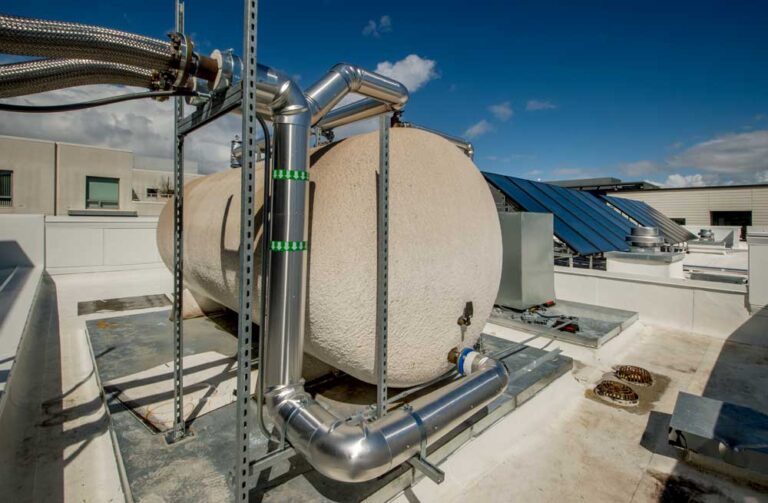Introduction
In breweries and distilleries, maintaining precise temperature control is critical for ensuring the quality and consistency of the final product. From fermentation to wort cooling, each stage of the brewing and distilling process demands reliable cooling solutions. Glycol chillers have become the go-to equipment in these industries due to their ability to provide consistent, low-temperature cooling. This guide will walk you through the key factors to consider when selecting a glycol chiller for your brewery or distillery, ensuring efficient operations and high-quality production.
What is a Glycol Chiller?
Glycol Chiller is a type of refrigeration system that uses a mixture of water and glycol (typically propylene or ethylene glycol) to cool down processes and equipment. The glycol acts as an antifreeze, allowing the chiller to maintain temperatures below freezing without freezing the liquid inside the system. This makes glycol chillers ideal for applications that require precise and stable low-temperature cooling, such as fermentation and wort cooling in breweries and distilleries.Glycol Chiller
Assess Your Cooling Needs
- Determine the Cooling Stages: Identify the various stages of the brewing or distilling process that require cooling. These typically include fermentation, wort cooling, and storage tanks.
- Calculate Heat Load: Estimate the total heat load based on batch size, number of fermenters, and the desired temperature differential. Accurate heat load calculation is essential for selecting a chiller with the right capacity.
- Consider Future Expansion: Plan for potential future expansion by considering additional cooling capacity for increased production down the line.
Choose the Right Chiller Type
- Air-Cooled vs. Water-Cooled: Decide whether an air-cooled or water-cooled glycol chiller is best for your facility.
- Air-Cooled Chillers: Suitable for facilities with limited water access and lower initial costs, but may be less efficient in larger applications.
- Water-Cooled Chillers: More efficient for larger operations, especially in environments with ample water supply, though they require cooling towers and more complex installation.
- Portable vs. Centralized: Determine whether a portable glycol chiller (suitable for small operations) or a centralized system (ideal for large-scale breweries) fits your needs.
Select the Proper Cooling Capacity
- Match Capacity to Needs: Ensure that the glycol chiller you choose has the appropriate cooling capacity for your operation. Chillers are often rated in BTUs (British Thermal Units) or tons of refrigeration, so matching these ratings with your calculated heat load is crucial.
- Consider Peak Demand: Ensure that the chiller can handle peak loads during high production times without compromising performance.
Focus on Temperature Precision and Control
- Temperature Range: Select a chiller capable of maintaining the precise temperature ranges required for brewing and distilling. Glycol chillers are often preferred because they can cool liquids below freezing, which is essential for maintaining quality in these industries.
- Digital Controllers: Look for chillers with advanced digital controllers that offer real-time temperature monitoring and precise control, which is critical for maintaining consistent product quality.
Energy Efficiency and Operating Costs
- Energy-Efficient Models: Opt for glycol chillers with high energy efficiency ratings. Features such as variable speed compressors and energy-saving modes can reduce operational costs over time.
- Cost of Operation: Factor in the long-term operational costs, including energy consumption, maintenance, and any necessary water treatment (for water-cooled systems).
Regulatory Compliance and Certifications
- Food-Grade Standards: Verify that the glycol chiller meets industry standards for food and beverage applications. Look for certifications such as NSF (National Sanitation Foundation) for safety and hygiene.
- Local and National Compliance: Ensure that the chiller complies with any local or national regulations related to energy efficiency, environmental impact, and safety.
Consult with Experts
- Seek Professional Advice: Consulting with an expert in brewing or distilling equipment can provide valuable insights into the specific needs of your operation. They can help recommend a glycol chiller that matches your unique requirements.
Redundancy and Backup Systems
- Backup Chillers: Consider implementing a backup glycol chiller or a system with redundancy to ensure uninterrupted cooling during maintenance or unexpected equipment failures.
- Redundant Pumps and Compressors: Some chillers come with redundant pumps or compressors to ensure continuous operation even if one component fails.
Water Quality Considerations
- Water Treatment Needs: For water-cooled glycol chillers, assess the quality of the water supply and determine if additional water treatment is required to prevent scale buildup, corrosion, or contamination.
- Closed-Loop Systems: Consider a closed-loop water system to minimize water usage and reduce the risk of contamination in the cooling process.
Long-Term Support and Warranty
- Extended Warranties: Look for manufacturers that offer extended warranties on key components such as compressors, pumps, and control systems to ensure long-term protection.
- Technical Support and Training: Ensure the chiller supplier offers comprehensive technical support, training, and troubleshooting assistance to maximize uptime and optimize performance.
Industry References and Case Studies
- Check Case Studies: Review case studies and references from other breweries and distilleries that have successfully implemented similar glycol chillers to gain insights into real-world performance and reliability.
- Manufacturer Reputation: Choose a glycol chiller from a reputable manufacturer with a proven track record in the brewing and distilling industries.
Choosing the right glycol chiller is a crucial step in ensuring the efficiency and success of your brewery or distillery. By thoroughly assessing your cooling needs, selecting the appropriate chiller type, and considering factors like energy efficiency, temperature precision, and future scalability, you can make a well-informed decision that will optimize your production process. Additionally, paying attention to maintenance, regulatory compliance, and long-term support will ensure that your glycol chiller remains reliable and cost-effective over time. Investing in the right cooling solution will ultimately help you maintain product quality, reduce operational costs, and support the growth of your brewing or distilling business.

